Identifying Talent's Role: Lidl's Organisational Structure and Culture
VerifiedAdded on 2023/06/09
|10
|2496
|287
Report
AI Summary
This research proposal aims to identify the role of talent in transforming the organizational structure and culture of the UK retail sector, specifically focusing on Lidl. The research explores the importance of talent in this transformation, examining the interplay between talent, organizational structure, and culture within the context of the UK retail industry. It investigates the challenges Lidl might face without digital workplace transformation. The research methodology includes a positivism research philosophy, a deductive research approach, and a survey research strategy using questionnaires. Data collection will involve 30 respondents who are employees of Lidl, and the research will employ a cross-sectional time horizon with probabilistic sampling. The proposal outlines the activities and timescales for the research project, including literature review, methodology, data collection, and analysis. The student will use a Gantt chart to manage the activities within the given timeframe and resources. The ethical considerations, including participant recruitment, consent, and data storage, are also addressed. The research references key literature sources to support its objectives and questions, providing a comprehensive overview of the topic.
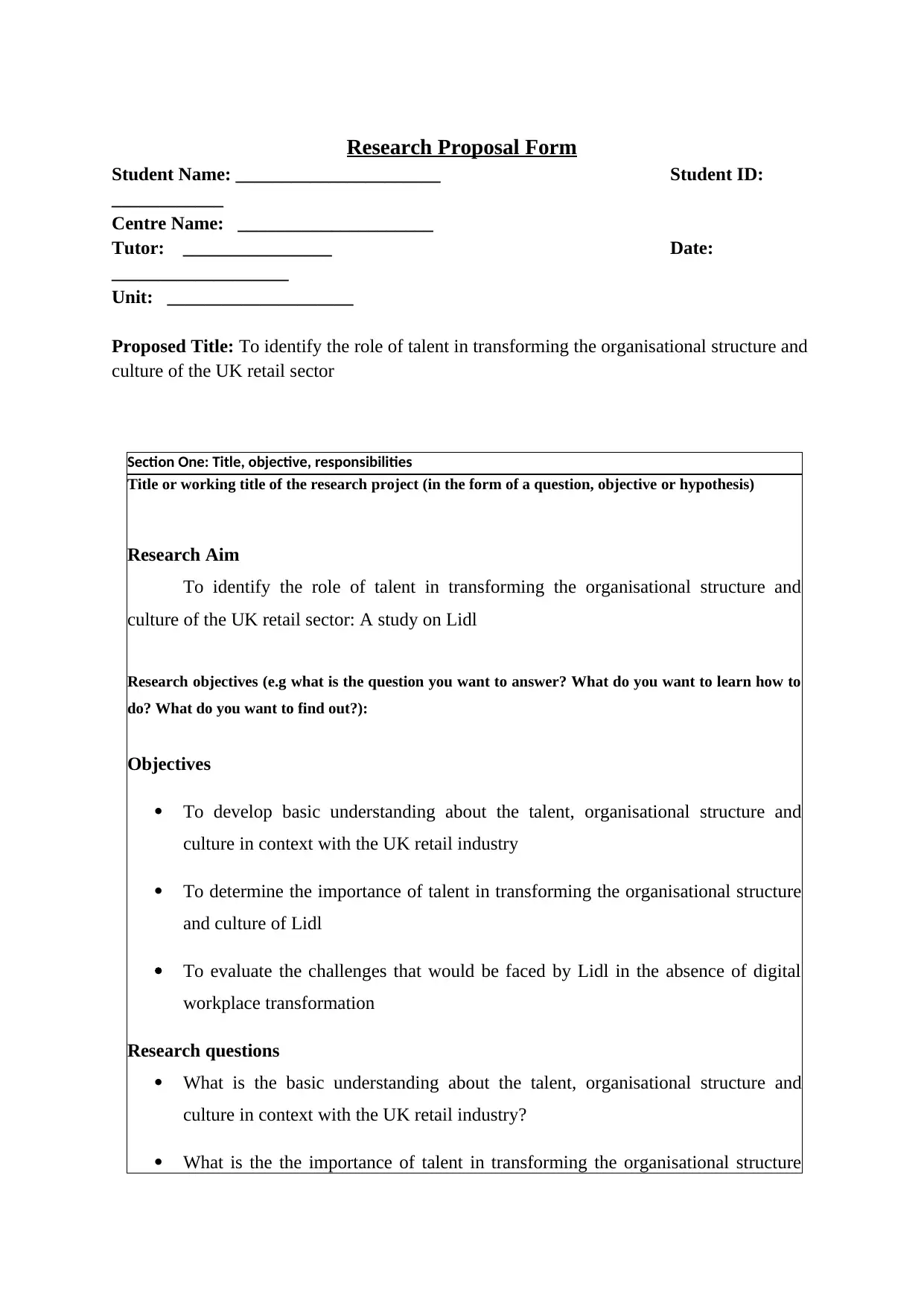
Research Proposal Form
Student Name: ______________________ Student ID:
____________
Centre Name: _____________________
Tutor: ________________ Date:
___________________
Unit: ____________________
Proposed Title: To identify the role of talent in transforming the organisational structure and
culture of the UK retail sector
Section One: Title, objective, responsibilities
Title or working title of the research project (in the form of a question, objective or hypothesis)
Research Aim
To identify the role of talent in transforming the organisational structure and
culture of the UK retail sector: A study on Lidl
Research objectives (e.g what is the question you want to answer? What do you want to learn how to
do? What do you want to find out?):
Objectives
To develop basic understanding about the talent, organisational structure and
culture in context with the UK retail industry
To determine the importance of talent in transforming the organisational structure
and culture of Lidl
To evaluate the challenges that would be faced by Lidl in the absence of digital
workplace transformation
Research questions
What is the basic understanding about the talent, organisational structure and
culture in context with the UK retail industry?
What is the the importance of talent in transforming the organisational structure
Student Name: ______________________ Student ID:
____________
Centre Name: _____________________
Tutor: ________________ Date:
___________________
Unit: ____________________
Proposed Title: To identify the role of talent in transforming the organisational structure and
culture of the UK retail sector
Section One: Title, objective, responsibilities
Title or working title of the research project (in the form of a question, objective or hypothesis)
Research Aim
To identify the role of talent in transforming the organisational structure and
culture of the UK retail sector: A study on Lidl
Research objectives (e.g what is the question you want to answer? What do you want to learn how to
do? What do you want to find out?):
Objectives
To develop basic understanding about the talent, organisational structure and
culture in context with the UK retail industry
To determine the importance of talent in transforming the organisational structure
and culture of Lidl
To evaluate the challenges that would be faced by Lidl in the absence of digital
workplace transformation
Research questions
What is the basic understanding about the talent, organisational structure and
culture in context with the UK retail industry?
What is the the importance of talent in transforming the organisational structure
Paraphrase This Document
Need a fresh take? Get an instant paraphrase of this document with our AI Paraphraser
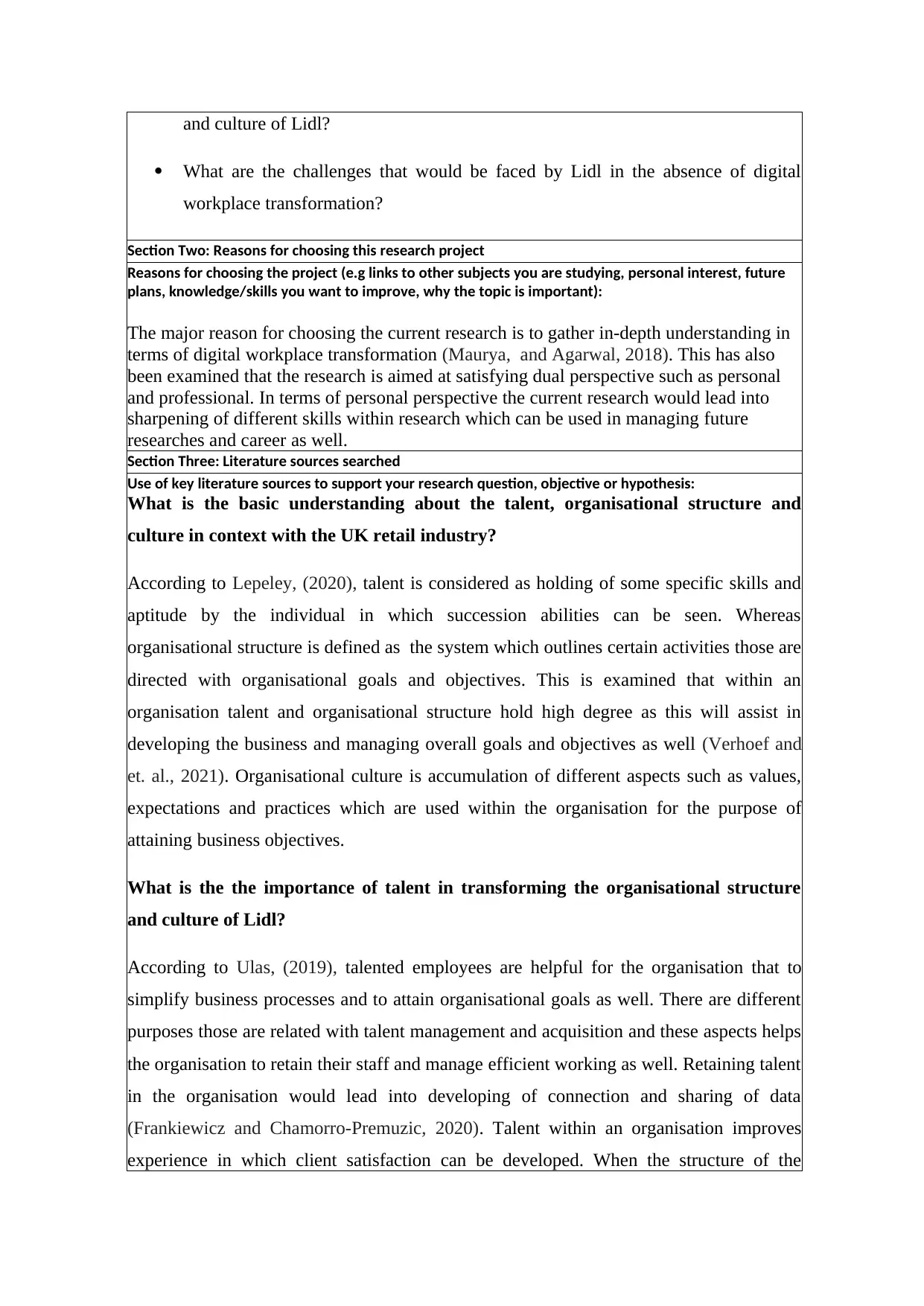
and culture of Lidl?
What are the challenges that would be faced by Lidl in the absence of digital
workplace transformation?
Section Two: Reasons for choosing this research project
Reasons for choosing the project (e.g links to other subjects you are studying, personal interest, future
plans, knowledge/skills you want to improve, why the topic is important):
The major reason for choosing the current research is to gather in-depth understanding in
terms of digital workplace transformation (Maurya, and Agarwal, 2018). This has also
been examined that the research is aimed at satisfying dual perspective such as personal
and professional. In terms of personal perspective the current research would lead into
sharpening of different skills within research which can be used in managing future
researches and career as well.
Section Three: Literature sources searched
Use of key literature sources to support your research question, objective or hypothesis:
What is the basic understanding about the talent, organisational structure and
culture in context with the UK retail industry?
According to Lepeley, (2020), talent is considered as holding of some specific skills and
aptitude by the individual in which succession abilities can be seen. Whereas
organisational structure is defined as the system which outlines certain activities those are
directed with organisational goals and objectives. This is examined that within an
organisation talent and organisational structure hold high degree as this will assist in
developing the business and managing overall goals and objectives as well (Verhoef and
et. al., 2021). Organisational culture is accumulation of different aspects such as values,
expectations and practices which are used within the organisation for the purpose of
attaining business objectives.
What is the the importance of talent in transforming the organisational structure
and culture of Lidl?
According to Ulas, (2019), talented employees are helpful for the organisation that to
simplify business processes and to attain organisational goals as well. There are different
purposes those are related with talent management and acquisition and these aspects helps
the organisation to retain their staff and manage efficient working as well. Retaining talent
in the organisation would lead into developing of connection and sharing of data
(Frankiewicz and Chamorro-Premuzic, 2020). Talent within an organisation improves
experience in which client satisfaction can be developed. When the structure of the
What are the challenges that would be faced by Lidl in the absence of digital
workplace transformation?
Section Two: Reasons for choosing this research project
Reasons for choosing the project (e.g links to other subjects you are studying, personal interest, future
plans, knowledge/skills you want to improve, why the topic is important):
The major reason for choosing the current research is to gather in-depth understanding in
terms of digital workplace transformation (Maurya, and Agarwal, 2018). This has also
been examined that the research is aimed at satisfying dual perspective such as personal
and professional. In terms of personal perspective the current research would lead into
sharpening of different skills within research which can be used in managing future
researches and career as well.
Section Three: Literature sources searched
Use of key literature sources to support your research question, objective or hypothesis:
What is the basic understanding about the talent, organisational structure and
culture in context with the UK retail industry?
According to Lepeley, (2020), talent is considered as holding of some specific skills and
aptitude by the individual in which succession abilities can be seen. Whereas
organisational structure is defined as the system which outlines certain activities those are
directed with organisational goals and objectives. This is examined that within an
organisation talent and organisational structure hold high degree as this will assist in
developing the business and managing overall goals and objectives as well (Verhoef and
et. al., 2021). Organisational culture is accumulation of different aspects such as values,
expectations and practices which are used within the organisation for the purpose of
attaining business objectives.
What is the the importance of talent in transforming the organisational structure
and culture of Lidl?
According to Ulas, (2019), talented employees are helpful for the organisation that to
simplify business processes and to attain organisational goals as well. There are different
purposes those are related with talent management and acquisition and these aspects helps
the organisation to retain their staff and manage efficient working as well. Retaining talent
in the organisation would lead into developing of connection and sharing of data
(Frankiewicz and Chamorro-Premuzic, 2020). Talent within an organisation improves
experience in which client satisfaction can be developed. When the structure of the
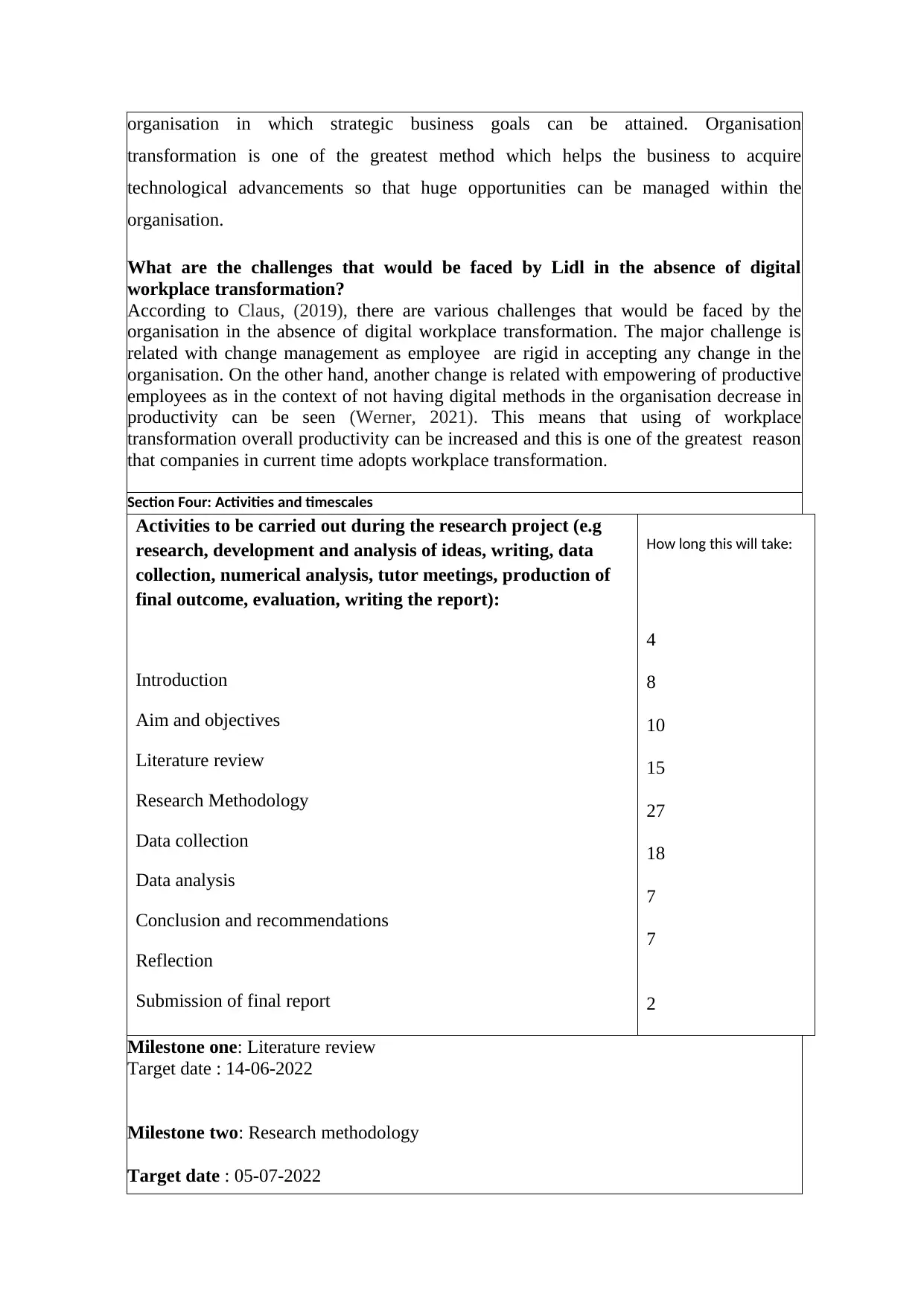
organisation in which strategic business goals can be attained. Organisation
transformation is one of the greatest method which helps the business to acquire
technological advancements so that huge opportunities can be managed within the
organisation.
What are the challenges that would be faced by Lidl in the absence of digital
workplace transformation?
According to Claus, (2019), there are various challenges that would be faced by the
organisation in the absence of digital workplace transformation. The major challenge is
related with change management as employee are rigid in accepting any change in the
organisation. On the other hand, another change is related with empowering of productive
employees as in the context of not having digital methods in the organisation decrease in
productivity can be seen (Werner, 2021). This means that using of workplace
transformation overall productivity can be increased and this is one of the greatest reason
that companies in current time adopts workplace transformation.
Section Four: Activities and timescales
Activities to be carried out during the research project (e.g
research, development and analysis of ideas, writing, data
collection, numerical analysis, tutor meetings, production of
final outcome, evaluation, writing the report):
Introduction
Aim and objectives
Literature review
Research Methodology
Data collection
Data analysis
Conclusion and recommendations
Reflection
Submission of final report
How long this will take:
4
8
10
15
27
18
7
7
2
Milestone one: Literature review
Target date : 14-06-2022
Milestone two: Research methodology
Target date : 05-07-2022
transformation is one of the greatest method which helps the business to acquire
technological advancements so that huge opportunities can be managed within the
organisation.
What are the challenges that would be faced by Lidl in the absence of digital
workplace transformation?
According to Claus, (2019), there are various challenges that would be faced by the
organisation in the absence of digital workplace transformation. The major challenge is
related with change management as employee are rigid in accepting any change in the
organisation. On the other hand, another change is related with empowering of productive
employees as in the context of not having digital methods in the organisation decrease in
productivity can be seen (Werner, 2021). This means that using of workplace
transformation overall productivity can be increased and this is one of the greatest reason
that companies in current time adopts workplace transformation.
Section Four: Activities and timescales
Activities to be carried out during the research project (e.g
research, development and analysis of ideas, writing, data
collection, numerical analysis, tutor meetings, production of
final outcome, evaluation, writing the report):
Introduction
Aim and objectives
Literature review
Research Methodology
Data collection
Data analysis
Conclusion and recommendations
Reflection
Submission of final report
How long this will take:
4
8
10
15
27
18
7
7
2
Milestone one: Literature review
Target date : 14-06-2022
Milestone two: Research methodology
Target date : 05-07-2022
⊘ This is a preview!⊘
Do you want full access?
Subscribe today to unlock all pages.

Trusted by 1+ million students worldwide
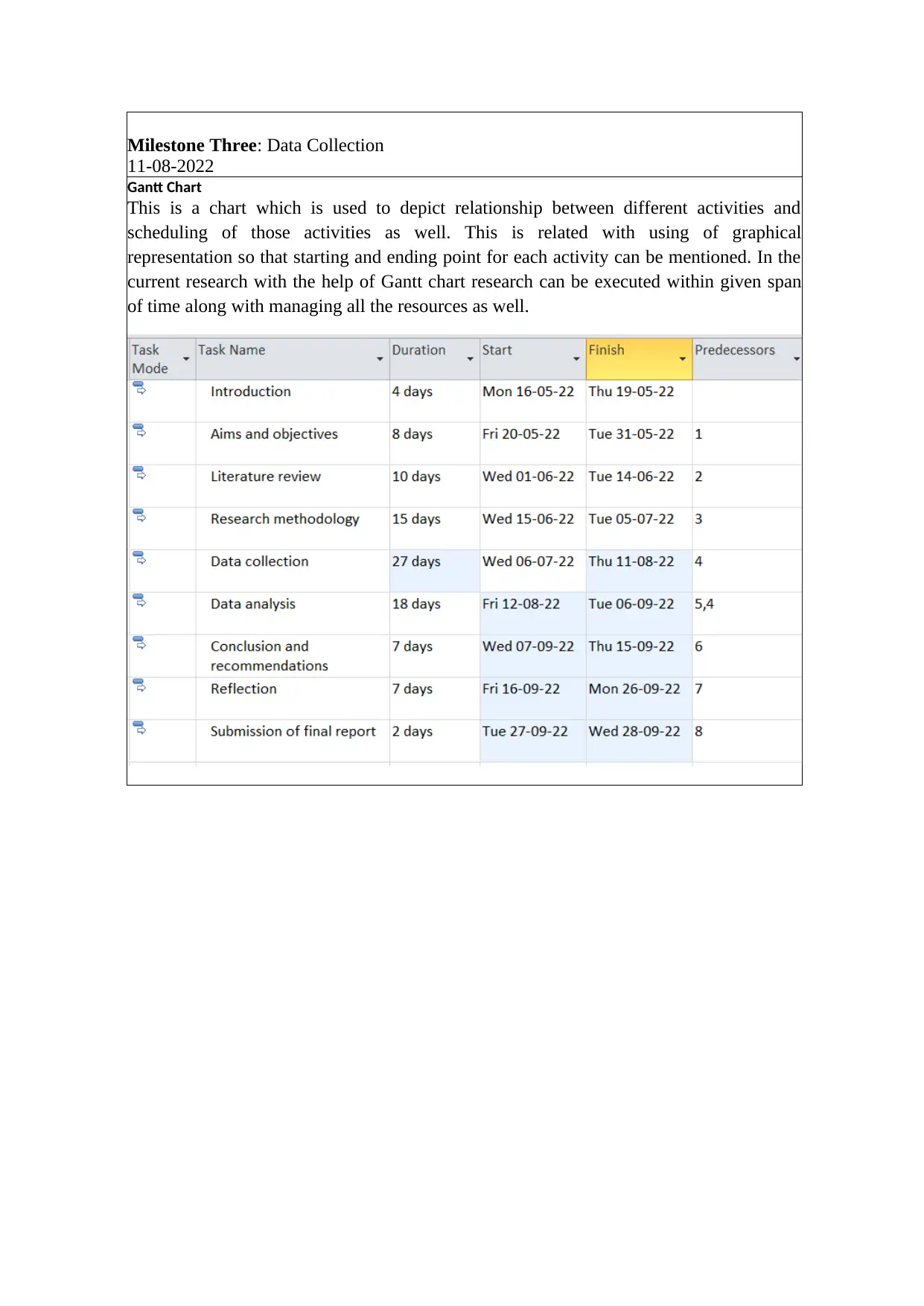
Milestone Three: Data Collection
11-08-2022
Gantt Chart
This is a chart which is used to depict relationship between different activities and
scheduling of those activities as well. This is related with using of graphical
representation so that starting and ending point for each activity can be mentioned. In the
current research with the help of Gantt chart research can be executed within given span
of time along with managing all the resources as well.
11-08-2022
Gantt Chart
This is a chart which is used to depict relationship between different activities and
scheduling of those activities as well. This is related with using of graphical
representation so that starting and ending point for each activity can be mentioned. In the
current research with the help of Gantt chart research can be executed within given span
of time along with managing all the resources as well.
Paraphrase This Document
Need a fresh take? Get an instant paraphrase of this document with our AI Paraphraser
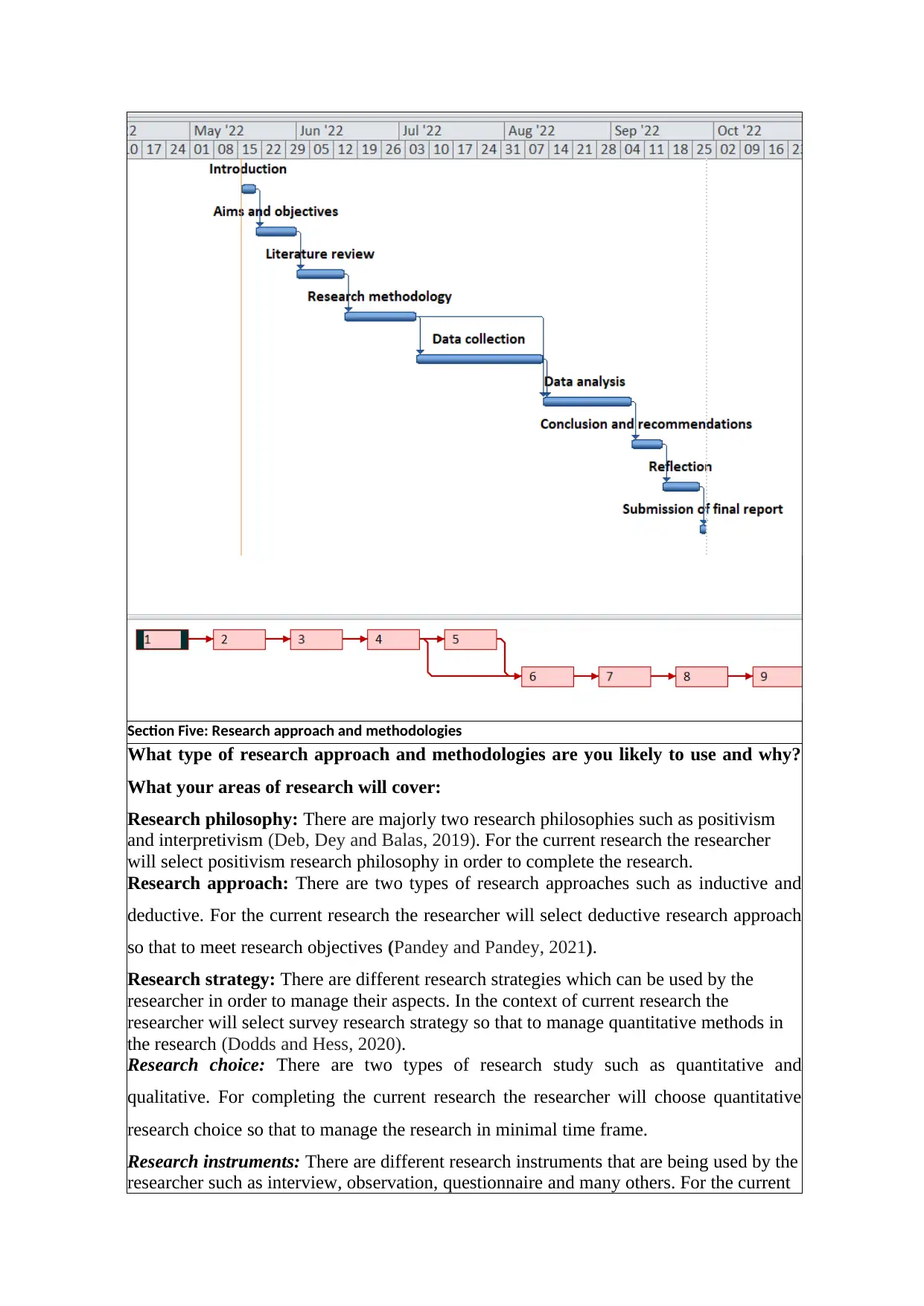
Section Five: Research approach and methodologies
What type of research approach and methodologies are you likely to use and why?
What your areas of research will cover:
Research philosophy: There are majorly two research philosophies such as positivism
and interpretivism (Deb, Dey and Balas, 2019). For the current research the researcher
will select positivism research philosophy in order to complete the research.
Research approach: There are two types of research approaches such as inductive and
deductive. For the current research the researcher will select deductive research approach
so that to meet research objectives (Pandey and Pandey, 2021).
Research strategy: There are different research strategies which can be used by the
researcher in order to manage their aspects. In the context of current research the
researcher will select survey research strategy so that to manage quantitative methods in
the research (Dodds and Hess, 2020).
Research choice: There are two types of research study such as quantitative and
qualitative. For completing the current research the researcher will choose quantitative
research choice so that to manage the research in minimal time frame.
Research instruments: There are different research instruments that are being used by the
researcher such as interview, observation, questionnaire and many others. For the current
What type of research approach and methodologies are you likely to use and why?
What your areas of research will cover:
Research philosophy: There are majorly two research philosophies such as positivism
and interpretivism (Deb, Dey and Balas, 2019). For the current research the researcher
will select positivism research philosophy in order to complete the research.
Research approach: There are two types of research approaches such as inductive and
deductive. For the current research the researcher will select deductive research approach
so that to meet research objectives (Pandey and Pandey, 2021).
Research strategy: There are different research strategies which can be used by the
researcher in order to manage their aspects. In the context of current research the
researcher will select survey research strategy so that to manage quantitative methods in
the research (Dodds and Hess, 2020).
Research choice: There are two types of research study such as quantitative and
qualitative. For completing the current research the researcher will choose quantitative
research choice so that to manage the research in minimal time frame.
Research instruments: There are different research instruments that are being used by the
researcher such as interview, observation, questionnaire and many others. For the current
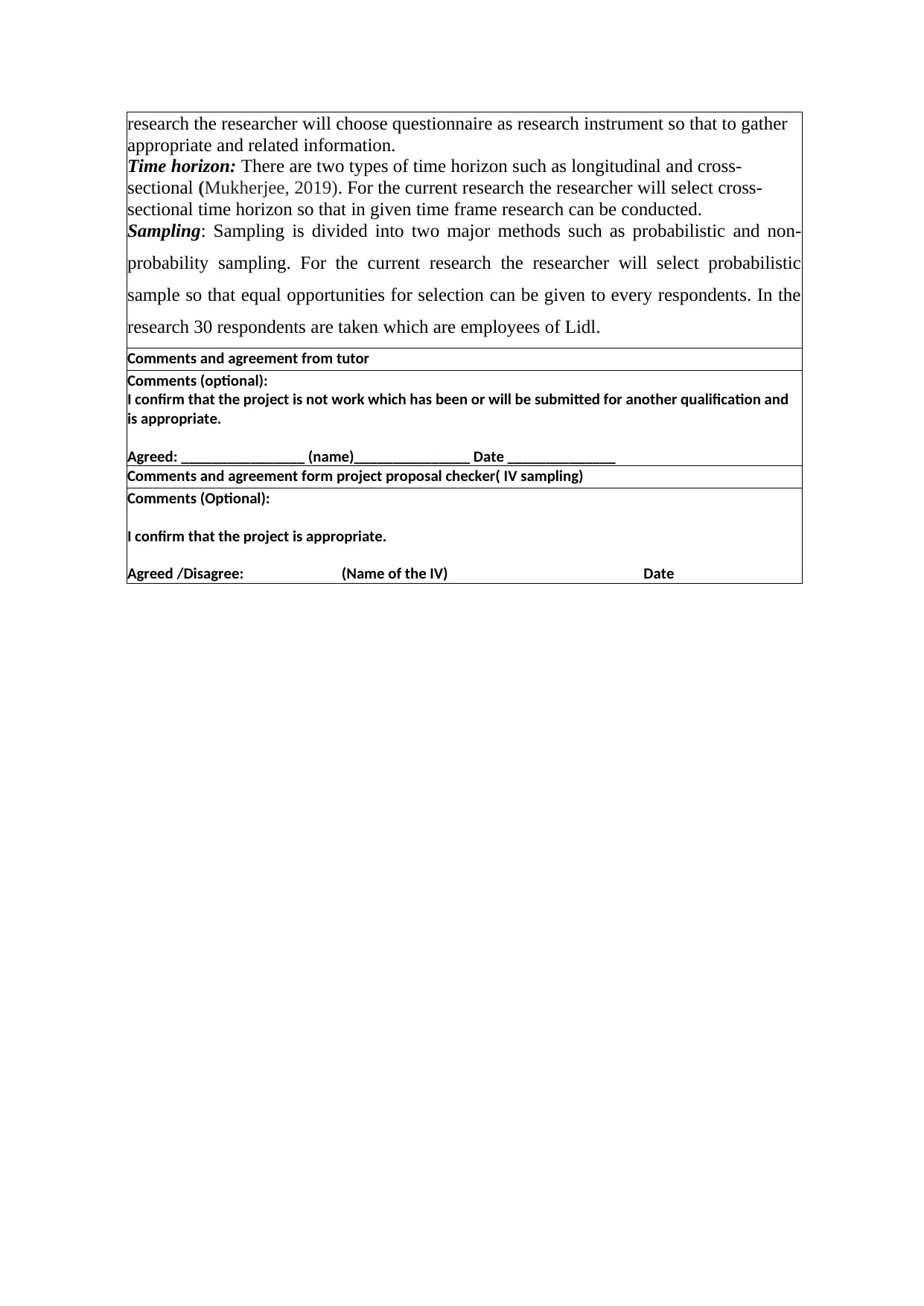
research the researcher will choose questionnaire as research instrument so that to gather
appropriate and related information.
Time horizon: There are two types of time horizon such as longitudinal and cross-
sectional (Mukherjee, 2019). For the current research the researcher will select cross-
sectional time horizon so that in given time frame research can be conducted.
Sampling: Sampling is divided into two major methods such as probabilistic and non-
probability sampling. For the current research the researcher will select probabilistic
sample so that equal opportunities for selection can be given to every respondents. In the
research 30 respondents are taken which are employees of Lidl.
Comments and agreement from tutor
Comments (optional):
I confirm that the project is not work which has been or will be submitted for another qualification and
is appropriate.
Agreed: ________________ (name)_______________ Date ______________
Comments and agreement form project proposal checker( IV sampling)
Comments (Optional):
I confirm that the project is appropriate.
Agreed /Disagree: (Name of the IV) Date
appropriate and related information.
Time horizon: There are two types of time horizon such as longitudinal and cross-
sectional (Mukherjee, 2019). For the current research the researcher will select cross-
sectional time horizon so that in given time frame research can be conducted.
Sampling: Sampling is divided into two major methods such as probabilistic and non-
probability sampling. For the current research the researcher will select probabilistic
sample so that equal opportunities for selection can be given to every respondents. In the
research 30 respondents are taken which are employees of Lidl.
Comments and agreement from tutor
Comments (optional):
I confirm that the project is not work which has been or will be submitted for another qualification and
is appropriate.
Agreed: ________________ (name)_______________ Date ______________
Comments and agreement form project proposal checker( IV sampling)
Comments (Optional):
I confirm that the project is appropriate.
Agreed /Disagree: (Name of the IV) Date
⊘ This is a preview!⊘
Do you want full access?
Subscribe today to unlock all pages.

Trusted by 1+ million students worldwide
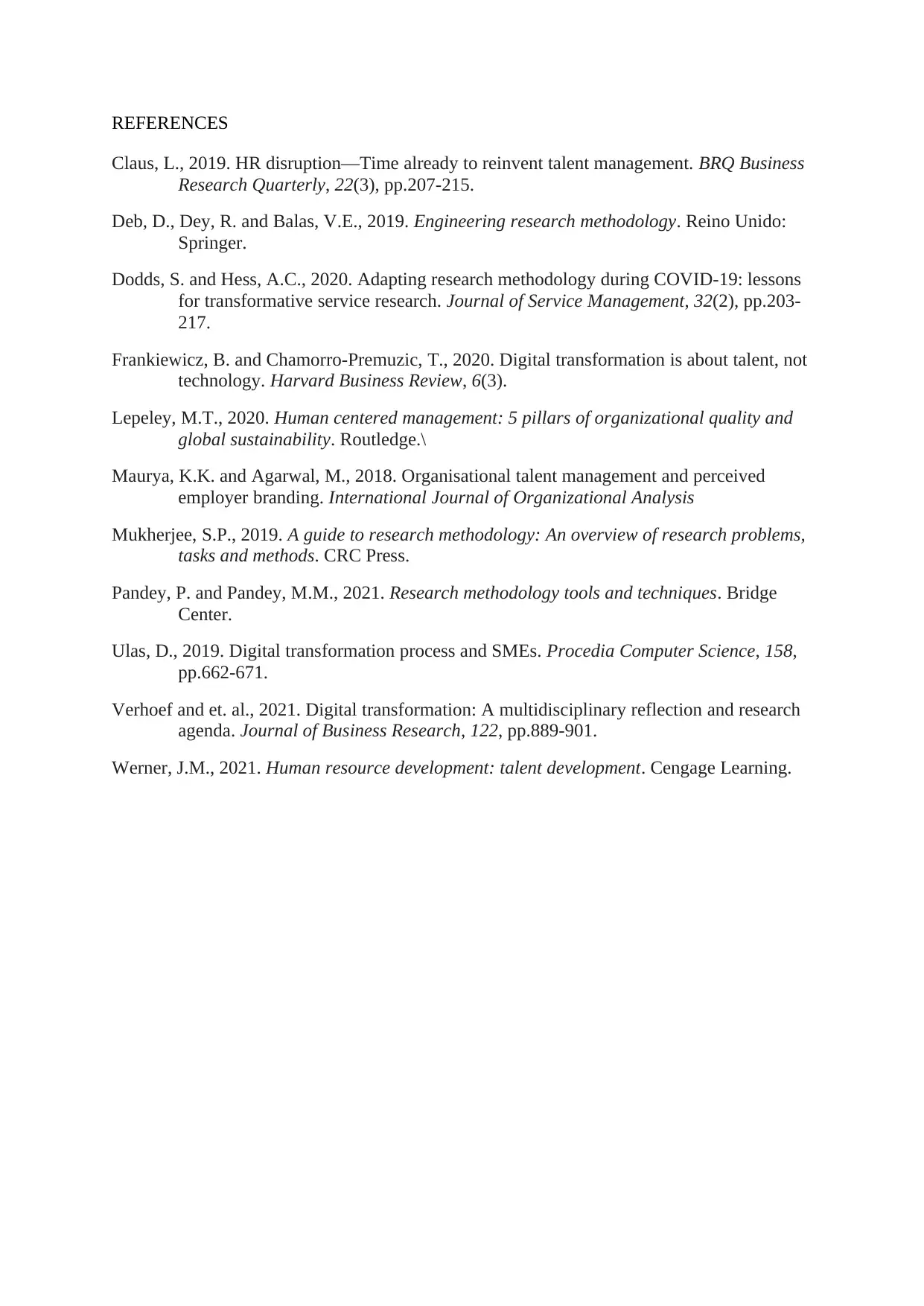
REFERENCES
Claus, L., 2019. HR disruption—Time already to reinvent talent management. BRQ Business
Research Quarterly, 22(3), pp.207-215.
Deb, D., Dey, R. and Balas, V.E., 2019. Engineering research methodology. Reino Unido:
Springer.
Dodds, S. and Hess, A.C., 2020. Adapting research methodology during COVID-19: lessons
for transformative service research. Journal of Service Management, 32(2), pp.203-
217.
Frankiewicz, B. and Chamorro-Premuzic, T., 2020. Digital transformation is about talent, not
technology. Harvard Business Review, 6(3).
Lepeley, M.T., 2020. Human centered management: 5 pillars of organizational quality and
global sustainability. Routledge.\
Maurya, K.K. and Agarwal, M., 2018. Organisational talent management and perceived
employer branding. International Journal of Organizational Analysis
Mukherjee, S.P., 2019. A guide to research methodology: An overview of research problems,
tasks and methods. CRC Press.
Pandey, P. and Pandey, M.M., 2021. Research methodology tools and techniques. Bridge
Center.
Ulas, D., 2019. Digital transformation process and SMEs. Procedia Computer Science, 158,
pp.662-671.
Verhoef and et. al., 2021. Digital transformation: A multidisciplinary reflection and research
agenda. Journal of Business Research, 122, pp.889-901.
Werner, J.M., 2021. Human resource development: talent development. Cengage Learning.
Claus, L., 2019. HR disruption—Time already to reinvent talent management. BRQ Business
Research Quarterly, 22(3), pp.207-215.
Deb, D., Dey, R. and Balas, V.E., 2019. Engineering research methodology. Reino Unido:
Springer.
Dodds, S. and Hess, A.C., 2020. Adapting research methodology during COVID-19: lessons
for transformative service research. Journal of Service Management, 32(2), pp.203-
217.
Frankiewicz, B. and Chamorro-Premuzic, T., 2020. Digital transformation is about talent, not
technology. Harvard Business Review, 6(3).
Lepeley, M.T., 2020. Human centered management: 5 pillars of organizational quality and
global sustainability. Routledge.\
Maurya, K.K. and Agarwal, M., 2018. Organisational talent management and perceived
employer branding. International Journal of Organizational Analysis
Mukherjee, S.P., 2019. A guide to research methodology: An overview of research problems,
tasks and methods. CRC Press.
Pandey, P. and Pandey, M.M., 2021. Research methodology tools and techniques. Bridge
Center.
Ulas, D., 2019. Digital transformation process and SMEs. Procedia Computer Science, 158,
pp.662-671.
Verhoef and et. al., 2021. Digital transformation: A multidisciplinary reflection and research
agenda. Journal of Business Research, 122, pp.889-901.
Werner, J.M., 2021. Human resource development: talent development. Cengage Learning.
Paraphrase This Document
Need a fresh take? Get an instant paraphrase of this document with our AI Paraphraser
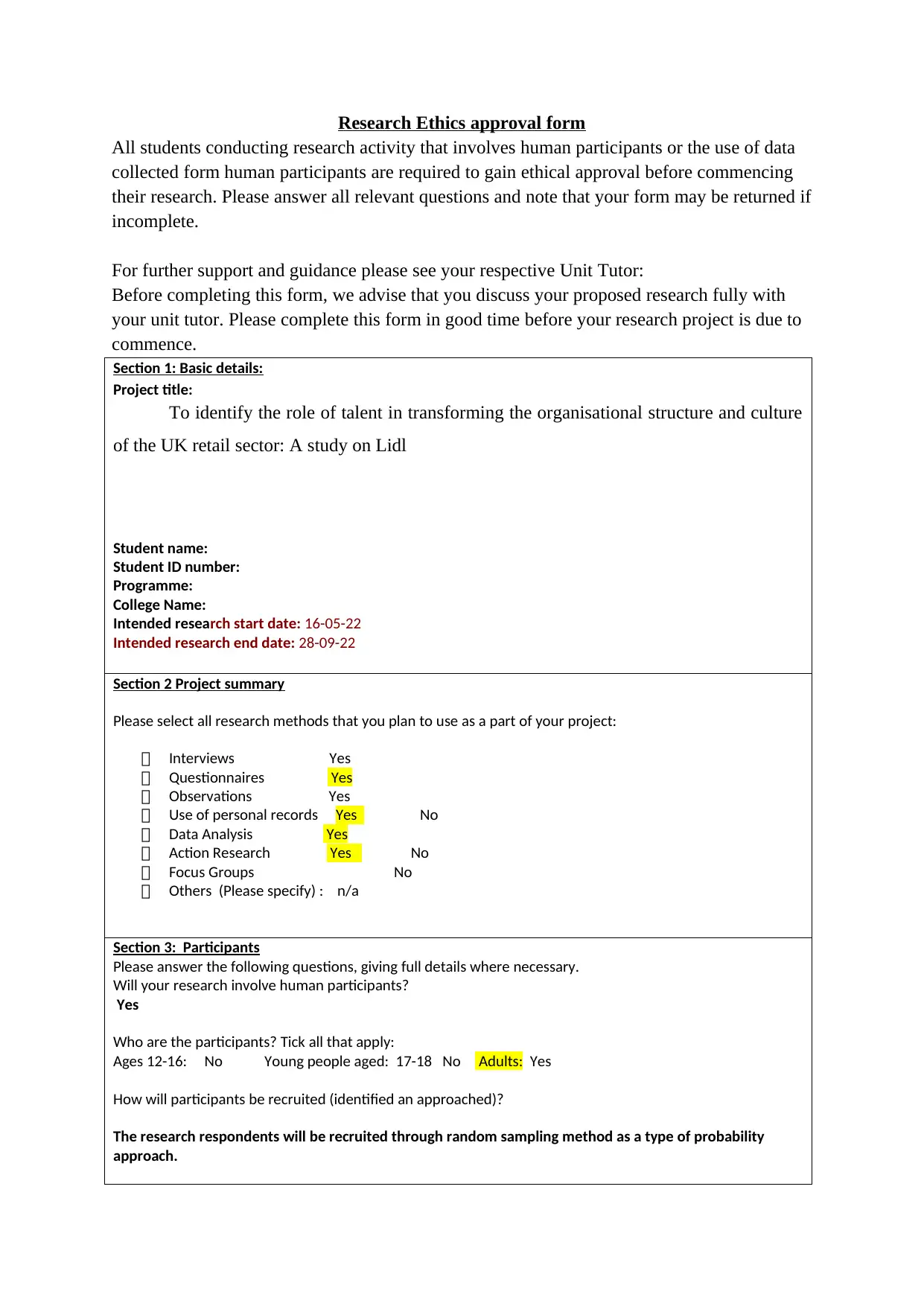
Research Ethics approval form
All students conducting research activity that involves human participants or the use of data
collected form human participants are required to gain ethical approval before commencing
their research. Please answer all relevant questions and note that your form may be returned if
incomplete.
For further support and guidance please see your respective Unit Tutor:
Before completing this form, we advise that you discuss your proposed research fully with
your unit tutor. Please complete this form in good time before your research project is due to
commence.
Section 1: Basic details:
Project title:
To identify the role of talent in transforming the organisational structure and culture
of the UK retail sector: A study on Lidl
Student name:
Student ID number:
Programme:
College Name:
Intended research start date: 16-05-22
Intended research end date: 28-09-22
Section 2 Project summary
Please select all research methods that you plan to use as a part of your project:
Interviews Yes
Questionnaires Yes
Observations Yes
Use of personal records Yes No
Data Analysis Yes
Action Research Yes No
Focus Groups No
Others (Please specify) : n/a
Section 3: Participants
Please answer the following questions, giving full details where necessary.
Will your research involve human participants?
Yes
Who are the participants? Tick all that apply:
Ages 12-16: No Young people aged: 17-18 No Adults: Yes
How will participants be recruited (identified an approached)?
The research respondents will be recruited through random sampling method as a type of probability
approach.
All students conducting research activity that involves human participants or the use of data
collected form human participants are required to gain ethical approval before commencing
their research. Please answer all relevant questions and note that your form may be returned if
incomplete.
For further support and guidance please see your respective Unit Tutor:
Before completing this form, we advise that you discuss your proposed research fully with
your unit tutor. Please complete this form in good time before your research project is due to
commence.
Section 1: Basic details:
Project title:
To identify the role of talent in transforming the organisational structure and culture
of the UK retail sector: A study on Lidl
Student name:
Student ID number:
Programme:
College Name:
Intended research start date: 16-05-22
Intended research end date: 28-09-22
Section 2 Project summary
Please select all research methods that you plan to use as a part of your project:
Interviews Yes
Questionnaires Yes
Observations Yes
Use of personal records Yes No
Data Analysis Yes
Action Research Yes No
Focus Groups No
Others (Please specify) : n/a
Section 3: Participants
Please answer the following questions, giving full details where necessary.
Will your research involve human participants?
Yes
Who are the participants? Tick all that apply:
Ages 12-16: No Young people aged: 17-18 No Adults: Yes
How will participants be recruited (identified an approached)?
The research respondents will be recruited through random sampling method as a type of probability
approach.
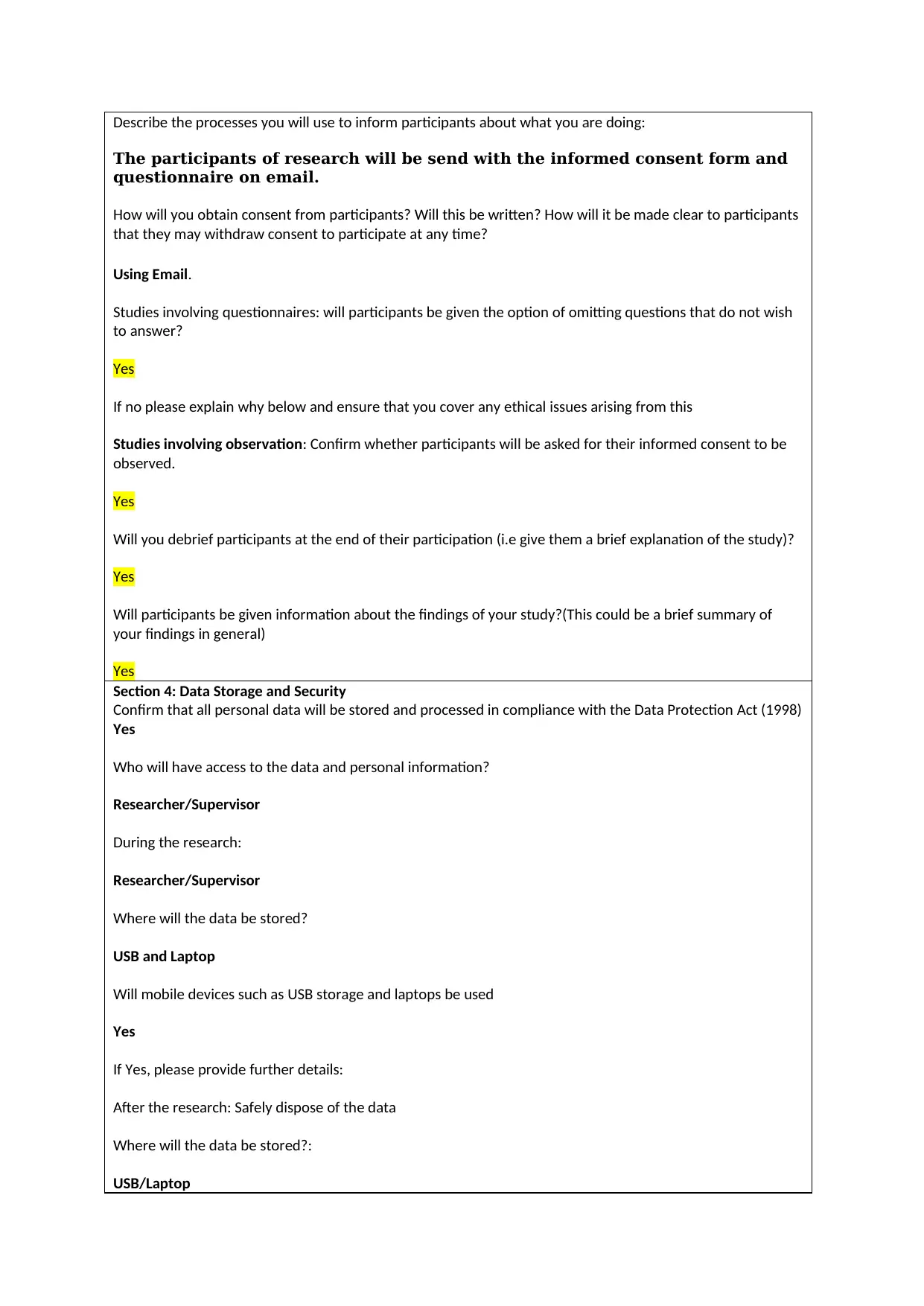
Describe the processes you will use to inform participants about what you are doing:
The participants of research will be send with the informed consent form and
questionnaire on email.
How will you obtain consent from participants? Will this be written? How will it be made clear to participants
that they may withdraw consent to participate at any time?
Using Email.
Studies involving questionnaires: will participants be given the option of omitting questions that do not wish
to answer?
Yes
If no please explain why below and ensure that you cover any ethical issues arising from this
Studies involving observation: Confirm whether participants will be asked for their informed consent to be
observed.
Yes
Will you debrief participants at the end of their participation (i.e give them a brief explanation of the study)?
Yes
Will participants be given information about the findings of your study?(This could be a brief summary of
your findings in general)
Yes
Section 4: Data Storage and Security
Confirm that all personal data will be stored and processed in compliance with the Data Protection Act (1998)
Yes
Who will have access to the data and personal information?
Researcher/Supervisor
During the research:
Researcher/Supervisor
Where will the data be stored?
USB and Laptop
Will mobile devices such as USB storage and laptops be used
Yes
If Yes, please provide further details:
After the research: Safely dispose of the data
Where will the data be stored?:
USB/Laptop
The participants of research will be send with the informed consent form and
questionnaire on email.
How will you obtain consent from participants? Will this be written? How will it be made clear to participants
that they may withdraw consent to participate at any time?
Using Email.
Studies involving questionnaires: will participants be given the option of omitting questions that do not wish
to answer?
Yes
If no please explain why below and ensure that you cover any ethical issues arising from this
Studies involving observation: Confirm whether participants will be asked for their informed consent to be
observed.
Yes
Will you debrief participants at the end of their participation (i.e give them a brief explanation of the study)?
Yes
Will participants be given information about the findings of your study?(This could be a brief summary of
your findings in general)
Yes
Section 4: Data Storage and Security
Confirm that all personal data will be stored and processed in compliance with the Data Protection Act (1998)
Yes
Who will have access to the data and personal information?
Researcher/Supervisor
During the research:
Researcher/Supervisor
Where will the data be stored?
USB and Laptop
Will mobile devices such as USB storage and laptops be used
Yes
If Yes, please provide further details:
After the research: Safely dispose of the data
Where will the data be stored?:
USB/Laptop
⊘ This is a preview!⊘
Do you want full access?
Subscribe today to unlock all pages.

Trusted by 1+ million students worldwide
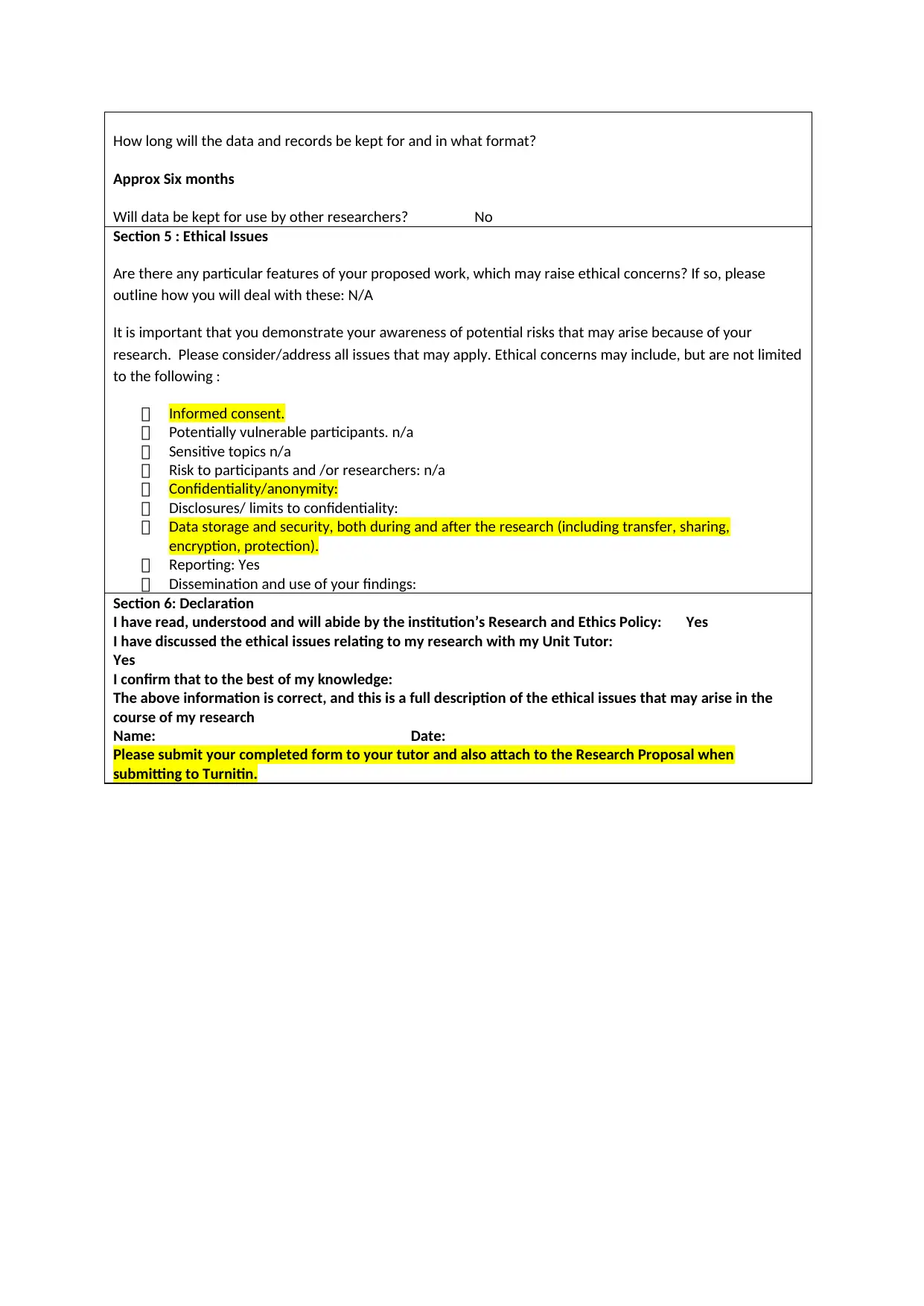
How long will the data and records be kept for and in what format?
Approx Six months
Will data be kept for use by other researchers? No
Section 5 : Ethical Issues
Are there any particular features of your proposed work, which may raise ethical concerns? If so, please
outline how you will deal with these: N/A
It is important that you demonstrate your awareness of potential risks that may arise because of your
research. Please consider/address all issues that may apply. Ethical concerns may include, but are not limited
to the following :
Informed consent.
Potentially vulnerable participants. n/a
Sensitive topics n/a
Risk to participants and /or researchers: n/a
Confidentiality/anonymity:
Disclosures/ limits to confidentiality:
Data storage and security, both during and after the research (including transfer, sharing,
encryption, protection).
Reporting: Yes
Dissemination and use of your findings:
Section 6: Declaration
I have read, understood and will abide by the institution’s Research and Ethics Policy: Yes
I have discussed the ethical issues relating to my research with my Unit Tutor:
Yes
I confirm that to the best of my knowledge:
The above information is correct, and this is a full description of the ethical issues that may arise in the
course of my research
Name: Date:
Please submit your completed form to your tutor and also attach to the Research Proposal when
submitting to Turnitin.
Approx Six months
Will data be kept for use by other researchers? No
Section 5 : Ethical Issues
Are there any particular features of your proposed work, which may raise ethical concerns? If so, please
outline how you will deal with these: N/A
It is important that you demonstrate your awareness of potential risks that may arise because of your
research. Please consider/address all issues that may apply. Ethical concerns may include, but are not limited
to the following :
Informed consent.
Potentially vulnerable participants. n/a
Sensitive topics n/a
Risk to participants and /or researchers: n/a
Confidentiality/anonymity:
Disclosures/ limits to confidentiality:
Data storage and security, both during and after the research (including transfer, sharing,
encryption, protection).
Reporting: Yes
Dissemination and use of your findings:
Section 6: Declaration
I have read, understood and will abide by the institution’s Research and Ethics Policy: Yes
I have discussed the ethical issues relating to my research with my Unit Tutor:
Yes
I confirm that to the best of my knowledge:
The above information is correct, and this is a full description of the ethical issues that may arise in the
course of my research
Name: Date:
Please submit your completed form to your tutor and also attach to the Research Proposal when
submitting to Turnitin.
1 out of 10
Related Documents
Your All-in-One AI-Powered Toolkit for Academic Success.
+13062052269
info@desklib.com
Available 24*7 on WhatsApp / Email
![[object Object]](/_next/static/media/star-bottom.7253800d.svg)
Unlock your academic potential
Copyright © 2020–2026 A2Z Services. All Rights Reserved. Developed and managed by ZUCOL.




